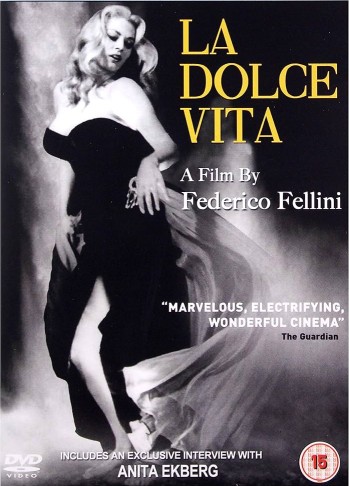Review of La Dolce Vita Federico Fellini 1960

Rae West big-lies.org 2 April 2024
Watched this monochrome film & decided to review it with a revisionist slant.
There's some fascination in looking at a movie 65 years old; most of the people are long dead, including Fellini (1920-1993). The sights have changed. media have changed—black and white can perhaps be seen with its original artificiality. Muse over the orange filters for blue sky, and over the changes needed for colour to get things looking right in colour temperatures and deep shadow.
Italy has something that the USA can never had, namely a few thousand years of history. But it has something else with counterparts in the Americas, notably the corrosive influence of Jews, which bequeathed death to the ancient world which may of course have deserved it.
Miles Mathis has a tremendous 1-MB pdf called benito.pdf which ranges around the Med and wealthy parts of the world, including Pareto, Lombardy, aristocracies, and lots more, in addition to Mussolini, including his sexual stuff and family acting things, including his staged death and close relatives in entertainment.
Another paper, 5 years later, has a lot on the Grimaldi family. These are terrific articles, and I can understand Mr Mathis being irate with me for implying my own website was quite good.
I've reviewed Fellini's Satyricon in all its colour, naturally mentioning Cinecittà in Rome.
La Dolce Vita was ten years earlier. It's a collection of scenes, reminiscent of amateur dramatics scripts each making different points and each intended to make its impression. There seems to have been a heavy promotional push. I have no idea why; maybe Jews wanted some cultural items; maybe people were sick of Hollywood crap; maybe the studio system was over-worked and under-performing; maybe American fashions were to be advertised. Someone called Levine bought it unseen for the US market. It received a collection of overlapping awards for which film, with multiple specialists, is so well adapted.
I think the title was chosen carefully, and well-chosen, with its adjective-first structure. I'm not sure any other Italian film became quite so famous. Marcello Mastroianni seems exactly right as lead—they wanted Paul Newman but fortunately, I think, he was dropped or not interested. Just another planted Jew lead. Anita Ekberg gave a fatty-layered giggly Monroe imitation. Anouk Aimée (the rich woman) seems to have had Dreyfus as her real name. I thought Yvonne Furneaux was perfect as the suicidal druggie Emma, but know nothing about her except she may have been related to a naturalist.
All-American stuff being pushed included dark glasses (1958 fashion for 'shades'), big wide gas guzzlers, Elvis style music, jazz attributed to blacks, and concrete apartment block Italianate versions of Khruschev housing. Fellini was some years earlier than the Beatles.
Non-US material includes Alitalia, Balenciaga sack dresses, and Catholic gullibility—the children seeing the madonna being based on a recent actual event. (The anti-Catholic Joseph McCabe said that their hierarchy disliked Lourdes when it started, regarding it as backward, but had to embrace it). We have the old family aristocratic types; similar to the Garden of the Finzi-Continis. Fellini included some then-modern technology—open-top cars, tape recorders, flashlights and Paparazzo and the others of them, big movie lights and their problems with rain, helicopters resembling bubble-cars.
Critics found plenty of sombre themes. There was no analogy to the holocaust fraud, and not much on the wartime events in other Italian film-makers, though the march on Rome was in there. No Italian film that I know of had any information on Jews. But they had sombre evasions on 'nuclear weapons' and suicidal intellectuals. And the decline of the family, with they young Mastroianni neglected by his salesman father, and a sprinkling of bold prostitution. A sea monster prop had a suggestion of pollution (I think). Quite a few Jewish themes were in there.
My very own site had a few hits from Cesena, due north of Rome, which received a mention from Mastroianni. I know nothing much about it—but ciao, guys!
Raeto West 2 April 2024